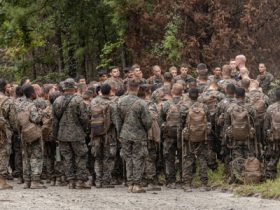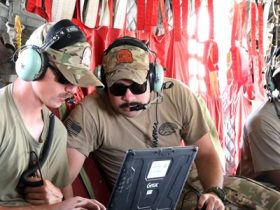New: Russian hackers have turned their sights on Taiwan, Dmitri Alperovitch noted Thursday on social media. Targets include Taiwanese companies and government agencies.
Why now? Possibly because just last month, Taiwan’s new president said that if Chinese Communist Party leaders’ dream of annexing Taiwan is (as they allege) about restoring territorial borders from a bygone era, then China should take back land ceded to Russia back in the 19th century “in the Treaty of Aigun during the Qing Dynasty.”
“This clearly shows that the intention to invade Taiwan is not about territorial concerns,” Taipei’s President Lai Ching-te said.
Rhetoric alert: Chinese leader Xi Jinping echoed the arguments of one of the deadliest dictators in history on Monday when he asserted at a state banquet in Beijing’s Great Hall of the People, “Taiwan is China’s sacred territory. Blood is thicker than water, and people on both sides of the strait are connected by blood,” according to CNN, citing state-run Xinhua news.
Former U.S. Navy submariner Tom Shugart pointed out the chilling similarities with Nazi leader Adolf Hitler, who wrote in Mein Kampf that the reunification of Germany and Austria “is a life task to be carried out by all means! German-Austria must be restored to the great German Motherland… People of the same blood should be in the same REICH.”
Coverage continues below the fold…
Welcome to this Thursday edition of The D Brief, brought to you by Ben Watson with Bradley Peniston. Share your newsletter tips, reading recommendations, or feedback here. And if you’re not already subscribed, you can do that here. On this day in 2015, the crew of a U.S. Air Force AC-130U gunship failed to consult their no-strike list for Kunduz, Afghanistan, and spent 30 minutes attacking a hospital operated by Doctors Without Borders. The early morning attack killed 42 people, including three doctors as well as others who were shot by U.S. gunners as they tried to flee the burning building. Officials later blamed a special operations commander on the ground, the gunship’s aircrew, commanders at Bagram airbase, and a poorly-rigged antenna for contributing to the tragedy. Sixteen American troops were disciplined afterward, though none faced criminal charges.
Leading U.S. security analyst: “China Is Ready for War,” Seth Jones of the Washington-based Center for Strategic and International Studies argued this week in Foreign Affairs. However, he explained, thanks to America’s “crumbling” defense industrial base, the U.S. appears to be nowhere nearly as prepared for a conflict with China.
The gist: “Despite the country’s current economic challenges, its defense spending is soaring and its defense industry is on a wartime footing,” Jones writes. “China has already caught up to the United States in its ability to produce weapons at mass and scale,” and it has “become the world’s largest shipbuilder by far, with a capacity roughly 230 times as large as that of the United States.”
A few areas the U.S. should improve upon in the months ahead, according to Jones:
- Its “anachronistic contracting and acquisitions system that is much better suited for the leisurely pace of peacetime than for the urgency of wartime”;
- U.S.-based production of certain “solid rocket motors, processor assemblies, castings, forgings, ball bearings, microelectronics, and seekers for munitions”;
- It will also need to shore up its “advanced battery supply chain,” since so many of the components are dominated by China;
- And U.S. shipyards need to somehow increase their supply of “engineers, electricians, pipefitters, shipfitters, and metalworkers.”
Related analysis: “What reports got wrong about China’s ‘sunken nuclear submarine,’” via J. Michael Dahm of Blue Path Labs with Peter W. Singer, writing Wednesday in Defense One. For one thing, there’s little actual evidence that the sub was nuclear. For another, the discussion of the sub in Chinese-language sources reveals interesting things about the state of the Chinese naval industrial base. Read on, here.
Related reading: “Why Can’t the U.S. Build Ships?” asked Brian Potter last month on his blog Construction Physics, answering with a 4,000-word run through history.
“In looking at the history of US shipbuilding, two major trends stand out,” he writes. “The first is the high cost of inputs, particularly labor and steel.” But the other factor is cultural, he argues. While some nations have been driven to build ships for trade or survival, the United States “never appears to have been strongly motivated to make its shipbuilding industry an international success. Historically it has been isolationist, trading much more with itself than it has with other countries.” Read the rest, here.
From the region: The Brits just announced a major change in how it manages a quietly-influential territorial relic from the colonial era. In a joint statement with Mauritius on Thursday, the two nations announced the Chagos Archipelago is Mauritius’s sovereign territory.
This includes the strategic Diego Garcia island, which the U.S. military has used to carry out its post-9/11 global war on terrorism. However, “both our countries are committed to the need, and will agree in the treaty, to ensure the long-term, secure and effective operation of the existing base on Diego Garcia which plays a vital role in regional and global security,” 10 Downing Street said Thursday.
Fine print: “For an initial period of 99 years, the United Kingdom will be authorised to exercise with respect to Diego Garcia the sovereign rights and authorities of Mauritius required to ensure the continued operation of the base well into the next century,” the joint statement reads.
The legal struggles of locals on Diego Garcia were thoroughly documented in a recent book from international law specialist Philippe Joseph Sands entitled, “The Last Colony: A Tale of Exile, Justice, and Courage.” The Brits forcibly removed some 2,000 people from the island in 1973, diverting them to Mauritius and the Seychelles. Sands’ account of that history is short but packed with emotion as he retraced just some of the lives disrupted by the Brits’ determination to stay on Diego Garcia against the will of the UN General Assembly.
“The [new] treaty will address wrongs of the past and demonstrate the commitment of both parties to support the welfare of Chagossians,” the joint statement reads. What’s more, “Mauritius will now be free to implement a programme of resettlement on the islands of the Chagos Archipelago, other than Diego Garcia, and the UK will capitalise a new trust fund, as well as separately provide other support, for the benefit of Chagossians.”
New small cruise missile slated for SOCOM gunship test. Leidos tells Defense One’s Patrick Tucker that its Black Arrow, a relatively small cruise missile with a designed range of about 400 miles, passed preliminary tests that set it up for an actual test launch out the back of a U.S. Special Forces Command AC-140J gunship sometime this fall.
Leidos, which is arguably better known for its weapons components than full-up rounds, exemplifies how digital engineering techniques are enabling the entry of new competitors in the missile market, and even the creation of new product categories. Read on, here.
Can ULA clear the final hurdle on Vulcan? United Launch Alliance’s much-delayed Vulcan heavy-lift rocket took its maiden flight in January, but it needs to complete a second certification flight—scheduled to take off from Cape Canaveral this Friday—before the rocket can start flying operational missions for the Pentagon. Defense One’s Audrey Decker has more, here.
Related reading: “Air Force taps Leidos to lead digital infrastructure for connect-everything effort,” Defense One’s Lauren C. Williams reported Wednesday.
Commentary: The U.S. military must prepare for a second Trump presidency. National Defense University professor Gregory Foster notes that the GOP presidential candidate “regularly denigrates those in uniform, seeks to undermine and circumvent the Constitution and the institutions of democracy, and selfishly uses the military for personal and political gain” and argues that the military must prepare now if it is “to maintain its dignity and self-respect as an institution, while also preserving the binding social contract of civil-military relations.” Read that, here.
Lastly today: The CIA is looking for informants from Iran, China and North Korea. The agency posted instructions Wednesday “on how to securely contact us” after it claimed unspecified success with the same approach targeting Russian speakers, Olivia Gazis of CBS News reported. “We want to make sure individuals in other authoritarian regimes know that we’re open for business,” an agency spokesman said.
According to NBC news, potential informants are advised “not to use their home or work computer; employ only up-to-date web browsers; use the browser’s private browser mode; delete computer searches and browser histories by following the CIA’s instructions; use the Tor network or a trusted VPN service not headquartered in Russia, Iran or China or other country hostile to the U.S.; and use a ‘kill switch’ feature on the VPN service” in case the VPN connection is lost.
Read the full article here








Leave a Reply